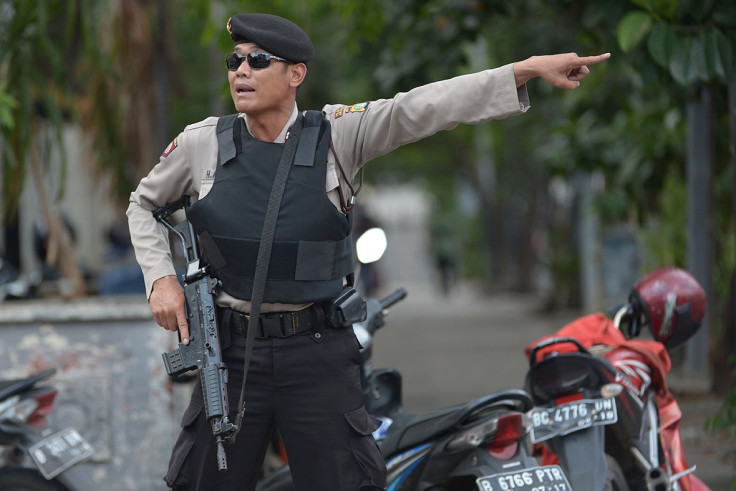Jakarta attacks: Southeast Asia nations tighten security after bombings

Southeast Asian nations have tightened security in their own cities following the Jakarta terror attacks on Thursday 14 January. The attacks, which saw bombs and gunfire in central Jakarta, have been described as a "Paris-style" suicide strike.
The attacks have confirmed the worst fears of Southeast Asian governments - that citizens returning home after fighting alongside the Islamic State (Isis) in the Middle East, are prepared to launch similar attacks at home. Media reports noted that Indonesia had seen six years of relative calm after the government cracked down on homegrown Islamic networks.
"We know that (Isis) has the desire to declare a province in this region and there are groups in this region ... that have pledged allegiance to [Isis]," said Kumar Ramakrishna, an expert on Southeast Asian militant groups at the Nanyang Technological University in Singapore. He continued: "The threat of returning Southeast Asian fighters radicalised in the Iraq/Syria region [is] also another factor of concern, together with the possibility of self-radicalised lone wolves appearing in the scene. Based on social media accounts, there seems to be a degree of coordination and a fair bit of sophistication in the attacks.
"This is not a lone wolf attack, it's planned. Significant planning was involved," Ramakrishna said.
In Indonesia, regions across the country, including the popular island resort which has already seen two major incidents of terror attacks in the past, have seen security tightened. In the North Sumatra capital of Medan and Bali, police officers have been deployed to secure government offices and the consulate general offices of Australia and the US. In addition, tourism hotspots, shopping centres and busy streets in both areas have been put under heavy guard.
The US Embassy in Jakarta has issued a statement saying that it will remain closed on Friday 15 January as a precaution following the terror attacks. The embassy will however, remain open for emergency services.
"Further incidents are possible. As the security situation remains fluid, US citizens are advised to avoid Sari Pan Pacific Hotel and Sarinah Plaza on Jalan Thamrin and defer non-essential travel in the city," it said.
In Malaysia, the security alert has been raised to the highest level, according to the top police officer, Inspector-General of Police Khalid Abu Bakar. "Increased security measures are in place at public places such as shopping malls and tourist spots, while extra precautionary actions will be implemented in border areas to prevent possible infiltration by terrorist elements," he said in a statement on Thursday 14 January.
He said the police are on constant vigilance and are closely monitoring the latest developments to ensure the safety and security of Malaysians. Those on the police radar as being related to terrorist activities will be closely monitored, Khalid added.
Called my Indon counterpart Coordinating Minister for Political, Legal and Security Affairs Luhut Pandjaitan this pm to...
Posted by Teo Chee Hean on Thursday, January 14, 2016
Singapore has also stepped up security measures following the Jakarta bombings. Deputy Prime Minister Teo Chee Hean said in his Facebook page: "In Singapore, we are watching the developments with concern and have stepped up security measures. All of us can also help by staying vigilant. Let us stand together, united against possible security threats."
Heightened VigilanceThe SAF has implemented heightened security measures in view of the multiple attacks in Jakarta....
Posted by The Singapore Army on Thursday, January 14, 2016
The Singapore Armed Forces has said it will conduct additional checks for "any irregularities and respond to any suspicious activities." It added that it is committed to keeping Singapore and "our camps safe and secure."
In Manila, the government assured the public that it was addressing any terror threat in the country following the attacks in Indonesia. The Presidential Communications Operations Secretary Herminio Coloma Jr said: "Government affirms the call of the Armed Forces of the Philippines and the Philippine National Police for our citizens to exercise heightened vigilance in support of our security forces' concerted efforts to address the threats posed by terror elements."
Military spokesman Colonel Restituto Padilla told AFP that there had been no recent specific threats picked up by the authorities in the Philippines. However, both the police and the military forces continue to monitor the usual threats from local terrorist groups, he added.
The Abu Sayyaf Group, which has been blamed for several bombings in the country and the Bangsamoro Islamic Freedom Fighters have pledged allegiance to Daesh. The military claims that both groups had in the past sheltered foreign militants fleeing Indonesia after the 2002 bombings in Bali in Indonesia.
© Copyright IBTimes 2025. All rights reserved.






















